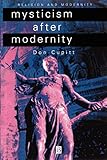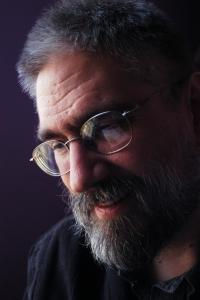Mysticism After Modernity
By Don Cupitt
Oxford: Blackwell Publishers, Ltd., 1998
Review by Carl McColman
 Don Cupitt presents a lucid and stimulating argument for ways to understand mysticism in the postmodern world. He suggests that the modernist understanding of mysticism (in vogue from approximately 1790 to 1970) was based on a fundamental error: the idea that a mystic was a person who had "mystical experiences," a sort of ineffable event which confirmed the truth of religious orthodoxy. Such ineffable experiences are based on an assumption that "experience" can exist prior to language, and furthermore that it is possible to have an experience which language cannot describe. But, as Cupitt points out, this privileging of experience over language has been rendered obsolete in the postmodern world, a world which recognizes that no experience exists apart from language and that ineffability is a self-contradictory notion. In Cupitt's words, "there is no meaningfulness and no cognition prior to language" (p. 11).
Don Cupitt presents a lucid and stimulating argument for ways to understand mysticism in the postmodern world. He suggests that the modernist understanding of mysticism (in vogue from approximately 1790 to 1970) was based on a fundamental error: the idea that a mystic was a person who had "mystical experiences," a sort of ineffable event which confirmed the truth of religious orthodoxy. Such ineffable experiences are based on an assumption that "experience" can exist prior to language, and furthermore that it is possible to have an experience which language cannot describe. But, as Cupitt points out, this privileging of experience over language has been rendered obsolete in the postmodern world, a world which recognizes that no experience exists apart from language and that ineffability is a self-contradictory notion. In Cupitt's words, "there is no meaningfulness and no cognition prior to language" (p. 11). Instead of the mystic as experiential defender of the faith, Cupitt considers how mystics in premodern times were, in essence, proto-deconstructionists—using the language of mystical literature to deconstruct the ability of the religious bureaucracy to regulate the spiritual lives of individuals. Now, in our postmodern age, we can read the mystics as writers whose texts attack the religious establishment—only today, we see in the mystics a profound celebration of the "secondariness" of all things. In other words, mystical literature allows us to consider that joy and ecstasy are possible without resorting to ecclesial authority or any "primary" object; rather, even in a world where everything is relative and free-floating and fluid—in other words, where everything is "secondary"—is such rapture possible.
Cupitt demonstrates the modern construction of mysticism by exploring the modernist assumptions behind the words "experience," "religious experience," "mysticism" and "spirituality." "Experience" is essentially a passive apprehension of things, arising out of the modernist assumption that knowledge and truth is "out there" and can be subjectively known through uninterpreted perception. "Religious experience," following William James, implies a specific type of experience in which each individual soul has access to supernaturally-inspired altered states—a notion which collapsed along with the assumption that the supernatural exists prior to language. Cupitt defines "mysticism" as "a tradition of devotional writing which commonly uses the vocabulary of Plato and the neoplatonists, and is rather consciously paradoxical." (p. 25). He points out that, prior to the mid-nineteenth century, "mysticism" is a term of disparagement, and only in the psychoanalytical environment of late modernity does mysticism take on a more fashionable identity as subjective religious experience. "Spirituality" in the modern era has been used essentially as a synonym for "piety," although with the arrival of postmodernity it is taking on more of a cultural, aesthetic dimension—less something we do so much as something we display, a lifestyle we choose—whether it be "charismatic" or "contemplative" or "new age."
Cupitt considers the theories of mysticism in modernity, showing how the modern idea of mysticism regards it as a universal, prelinguistic experience which can serve to validate all religious and ethical knowledge in the same way that empirical experience validates scientific knowledge. But in order for this view of mysticism to work, it must rely on theological realism, semi-realism, or naturalism—in other words, it must rely on the idea that God is "out there" coming to the mystic in his or her cultural language or symbols, or on the idea that nature (and especially sexuality) are adequate tools for describing the encounter with the Divine. But, Cupitt argues, all this amounts to a "wild goose chase," a "distraction" in which mysticism does nothing to advance the cause of theological realism—and yet, if mysticism relies on realism or naturalism, then mysticism itself has been undermined in the postmodern world just as realism and naturalism have been undermined.
As an alternative, Cupit considers the idea that, at least in Europe, most Christian mystics wrote in reaction to the consolidation of dogmatic theology and absolute papal authority that was epitomized by Urban VIII's Bull Unum Sanctum in 1302: "We declare, state, define, and pronounce that it is altogether necessary to salvation for every human creature to be subject to the Roman pontiff." Cupitt argues that "the mystic is a religious anarchist and utopian, who speaks for an ancient tradition of protest against religious alienation." (p. 56). Furthermore, since the idea that pure thought precedes language is no longer tenable (consider, for example, how a deaf child needs to learn sign language in order to exhibit normal intellectual development), the idea that "mystical experience" exists somehow beyond language is equally invalid. Thus, Cupitt argues that mysticism is not a matter of experience put imperfectly into words, but is rather in itself simply a kind of writing—a discourse intended to produce religious happiness, not by appealing to some supralingual experience, but simply in itself.
How does mystical writing produce religious happiness? Using John of the Cross' "Cancion de la subida del Monte Carmelo" as an example, Cupitt shows how the mystic declared the possibility of transformation and union in divine love, but hidden under the imagery of human illicit eroticism. Why illicit eroticism? Because within John's world—the world of Catholic objective reality—divine union is a deferred pleasure, attainable only through compliance with the dictates of the church. John subverts that world-view by suggesting (but never directly saying) that religious happiness is available directly, bypassing the officially approved channels of religious obedience.
Cupitt argues that mystical writing is essentially political in nature. Against the masculine, authoritarian, legalistic culture of dogmatic theology, the theology of the mystic is erotic, feminine, poetic, and subversive. He suggests that one reason why so few mystical writers have emerged in the twentieth century is because, with the declining power of the church as a force for regulating and controlling the lives of individuals, there is a declining need for the "alternative" viewpoint of the mystic. But examples exist, from George Fox in the seventeenth century to Thomas Merton in the twentieth, of mystics who clearly articulate a political dimension in their writings. And so the future of mysticism may involve the tools of this literary tradition being used not to subvert dogmatic theology, but to subvert other forms of social control, such as capitalism. He considers the paradoxical and playful mysticism of Eckhart to explore the idea that mysticism was the forerunner of deconstruction and radical theology. He goes on to say that "mystical writing always attempts to deconstruct those orthodox doctrines (about God and the soul, etc.) that stand in the way of religious happiness; and mystical writing also seeks to find ways of bypassing the officially controlled channels of salvation." (p. 109)
But how do mystics articulate this subversive, deconstructive religious happiness? Cupitt thinks the greatest mystical achievement lies in what he calls the "meltdown," where both God and the self are both united (in an erotic fashion) and dissolved into the other. This, of course, goes beyond the pale of orthodoxy, so the greatest mystics are the ones with the greatest command of language—like Eckhart or John of the Cross—able to couch subversive notions in carefully-crafted writing that appears, at least on the surface, to fall within the bounds of dogmatic acceptability.
In the end, mysticism leads to secondariness—to a world without the authority of the church or the authority of the state, without a reified God who exists as some sort of timeless supercop who will judge us when we die. Without all these fixed absolutes, all things are in flux, all things flow, everything comes and goes. Happiness arises out of recognition that we do not have to rely on an external authority to make us "good," nor do we need to defer life or wellbeing to some distant point after we die.
Cupitt sees two competing forms of postmodernity: "right postmodernism," or attempts to reclaim the modern or even the premodern world (exemplified by religious fundamentalism), and "left postmodernism," which delights in the flux and impermanence and secondariness of all things. Cupitt bluntly states his support for the left, and argues that mysticism after modernity rejoices in the flux and the flow and the lack of any fixed absolute, be it God or whatever.
While the argument of this short book may feel threatening (or at the least, absurd) to anyone whose thought is grounded in the modernist notion of mysticism-as-supralingual-experience, Mysticism After Modernity should prove invaluable to those concerned about the relevance and ongoing survival of the mystical tradition in the post-Derrida world we now inhabit.
This review originally appeared on the "Academic Discussion of Mysticism" e-list.


1 Comments:
thanks for it.
blessed be your soul.
Post a Comment
<< Home